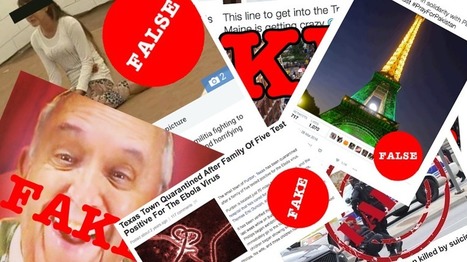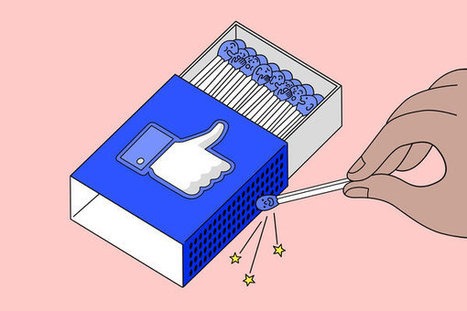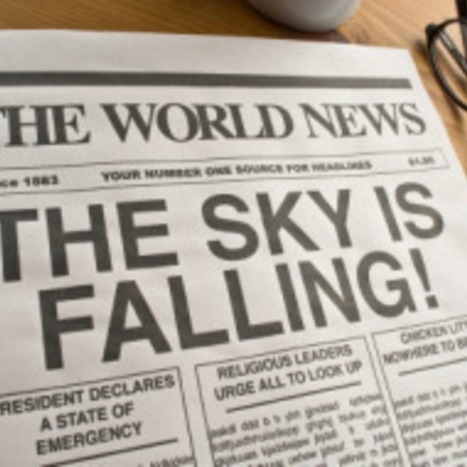 Your new post is loading...
 Your new post is loading...
For some it is a prank, akin to a crank call for the digital age. For others, it’s a narcissistic effort to rack up likes and followers. Others see political opportunity and want to hijack people’s attention for their own political or commercial gain. I've written before about those who originate misinformation and spread fake images during crises and disasters. But once the misinformation is out there, why do people share it? And how can understanding this question help us combat rumors and foster more trustworthy coverage and reporting during breaking news? People want to helpPeople have never felt as close to breaking news as they do today. It shows up daily in our social media feeds, through graphic pictures and autoplay videos, unfiltered and raw. A series of tweets or a Facebook live video can bring us to the scene of a shooting, a bomb explosion, an earthquake. The result can be, as one author writes, a “burgeoning sense of helplessness. ”In the face of a tragedy unfolding in front of you a lot of people want to help. They want to tell their followers what is going on, to pass along important information, share dramatic photos that help add context to the chaos. Sometime these posts are even accompanied by warnings, safety advice, and specific calls out to friends and followers who might be affected. Matt Stempeck has studied how people mobilize online to support each other through “peer aid” in times of crisis....
Two months after The New York Times‘ devastating takedown of Amazon’s culture, Amazon fired back. Where’s the whole truth here?
Where’s the whole truth here? There is none. Because by definition, stories always leave out more than they include.
As briefly as possible, here’s what happened. On August 15, the Times wrote about Amazon’s “bruising workplace.” Jeff Bezos emailed his employees a non-denial denial of the story. Two months passed. Amazon PR head (and former Obama press secretary) Jay Carney ripped the article in a post on Medium. The executive editor of the Times, Dean Baquet, responded. Carney rebutted. Finally — well, finally is a word I can’t really use here, but anyway, two other Times reporters published a story about the fight.
As I attempted to retrieve the truth from this food fight, this is what became clear. There is none. Because by definition, stories always leave out more than they include.
The proportion of corporate directors who say their companies are monitoring social media for “adverse publicity” (a gentle euphemism) has increased from 32% in 2012 to 41% today, according to the latest Corporate Directors Survey from PricewaterhouseCoopers.
However, as these figures indicate more than half of corporate directors still believe their companies aren’t doing a good enough job of keeping an eye out for adverse publicity: 55% of the PwC survey respondents said their companies either aren’t monitoring social media efficiently, or aren’t doing it at all. That’s down moderately from 61% in 2012.
PwC found a similar story in regards to social media strategies for applications like marketing, research, and internal communications. Thus 40% of respondents said their companies are leveraging social media for strategic goals, while 54% said their companies’ efforts to leverage social media are insufficient or nonexistent; both figures are unchanged from two years ago....
Here’s another one for the bulging “Kids Are Dumb” file: it seems a Florida teenager has cost her father an $80,000 legal settlement with a single, profoundly ill-advised Facebook post.
Patrick Snay, 69, had served as headmaster at a Miami private school called Gulliver Preparatory School until 2010, when his contract wasn’t renewed. Snay sued Gulliver for age discrimination, and in November 2011, the school settled out of court with an agreement to pay Snay $80,000 in damages, $10,000 in back pay, and $60,000 in legal fees. As is often the case, one of the conditions of the settlement was confidentiality, with Snay and his wife promising not to tell anyone about the existence or terms of the deal.
However Snay did tell his daughter Dana, a former student at the school, who now boasted to her 1,200 closest friends on Facebook: “Mama and Papa Snay won the case against Gulliver. Gulliver is now officially paying for my vacation to Europe this summer. SUCK IT.” Gulliver alumni saw the posts and alerted the school’s lawyers, who promptly informed Snay senior the deal was off. He had obviously violated the confidentiality clause....
Oprah Winfrey, one of the world’s richest women valued at over 2.9 billion dollars, was refused 3 times the opportunity to examine and purchase a 37 thousand dollar Tom Ford handbag. This happened at a posh upscale boutique in Switzerland.
The resulting news and social media backlash for the boutique involved and Switzerland itself (the country’s tourism office also apologized to her) was rapid and explosive, with negative commentary from news organizations, Facebook, Twitter, media publications and the like chiming in. Don’t be surprised by this! Anything that touches on deeply personal values (racism, gender equality, lifestyle, health, etc.) will quickly mushroom into an immense social media unconscious event. It will either become a social media dream or in this particular case…the ultimate social media brand reputation management nightmare.
This wake up call provides a powerful opportunity for businesses regarding their reputation management process. Not every business has a plan in place and for those who don’t know where to start, consider these 3 compelling reputation management tips....
Just about every plan we put together these days includes aspects of social media crisis management. Presenting a variety of platforms and utilities that are perfect for communications, reputation management, monitoring stakeholder sentiment and a host of other specialized uses.
Add to that the fact that your audience is all but guaranteed to be both talking about and searching for information on your crisis via social media, and the question of whether to use social for your next crisis management campaign becomes a no-brainer.
...Montreal Maine and Atlantic Railway has drawn the ire of local residents and even the premier for what has been described as a slow, largely unilingual, and even tone-deaf response to the tragedy.Ed Burkhardt, the president and CEO of the railway's parent company, Rail World, Inc., arrived on the scene Wednesday, nearly five days after the derailment incinerated the town centre.
He commented to a TVA television reporter beforehand that "I hope that I don't get shot at. I won't have a bullet proof vest on."Quebec Premier Pauline Marois said she understood Burkhardt didn't speak French, but felt he could have arrived on the scene earlier."It's a completely deplorable attitude from the company," Marois said in Quebec City....
Paula Deen supporters lashed out on Facebook and Twitter against the companies that terminated partnerships with the southern cooking star in light of her racially insensitive remarks.
The Facebook pages of Wal-Mart, Caesars, Home Depot, Smithfield, Sears , Target and The Food Network have been plastered with angry comments in support of Deen. Each of the pages had dozens -- and in some cases hundreds -- of Deen-related comments, overwhelming the companies' social conversation....
...Despite the outpouring of support for Deen, social media marketing consultants note that Facebook (FB) comments typically don't impact brands on their own. Negative reactions on Twitter, on the other hand, can actually do some serious damage.Unlike Facebook comments, tweets and blog posts can show up in search results when consumers Google a company. If the first results that come up when searching for Target are "I'm never shopping at Target again after they dropped Paula Deen," that could have a lasting impact....
|
Police departments around the country are using high-powered analytics software to comb social media and calculate threat levels for individual suspects before they are arrested, according to the Washington Post, which first reported the news.
The program, called “Beware,” uses addresses awaiting police response, finds the names of individuals who lives there, and checks their name against social media and other publicly available sources of information like property records and prior arrests to determine if they may pose a threat to responding officers. In one example cited by the software’s manufacturer, Intrado, an individual who is a military veteran with post-traumatic stress disorder and posted troubling comments on social media would raise a red flag....
It’s no surprise that interesting and unusual claims are often the most widely circulated articles on social media. Who wants to share boring stuff?
The problem, however, is that the spread of rumors, misinformation and unverified claims can overwhelm any effort to set the record straight, as we’ve seen during controversies over events like the Boston Marathon bombings and the conspiracy theory that the Obama administration manipulated unemployment statistics.
Everyone knows there is dubious information online, of course, but estimating the magnitude of the problem has been difficult until now....
A study by Brandfog found that 75 percent of Americans surveyed agree that CEO participation in social media leads to better leadership.
That’s up a remarkable 30 percent over the results in 2012. The survey also found that 77 percent of Americans said that C-suite executives who engage on social media create more transparency for the brand, and 80 percent agreed that social media has become an essential aspect of PR and communications strategy for C-Suite executives.
That is key, particularly when crisis strikes. It gives the CEO and the brand both the credibility and channel to manage a crisis response....
“Many studies have already shown how important crisis management is for organizations,” Hong said. “This study shows that Facebook can be a valuable tool for public relations professionals when working to solve or lessen the severity of a crisis. Because Facebook is very personal for its users, well-thought-out crisis management messages can be effective at reaching users on a personal level, which is a powerful way to persuade people to a cause.”
Hong also found that Facebook posts written in a narrative style were more effective than posts written in a non-narrative format. Narrative style is chronological and focuses more on story-telling rather than fact listing.
“This indicates that the effect of narrative tone in organizational statements during crises increases perceived conversational human voice, which represents a high level of engagement and best communicates trust, satisfaction, and commitment to the audience,” Hong said. “This is an important practice for public relations professionals because perceptions that an organization is sincerely trying to provide timely and accurate information during a crisis can lead to not only more favorable attitudes toward the organization, but also perceptions of less responsibility the organization has for causing the crisis.”...
Allow me a moment of nostalgia for the classic liveblog. “Liveblogging” was this thing we used to do before the rise of Twitter and Storify, much like good old-fashioned blogging itself. You’d have a host and a bunch of guests all watching the same Web page together, and for an hour or so, they’d make magic.
I should confess: every now and then, I get a hankering for some of that old magic. I pour some good wine, dust off a CoverItLive console, and invite some friends over.* And every time I do, I’m reminded why genuine liveblogging — real-time, browser-based liveblogging — is still one of my favorite instruments in the modern journalism toolkit. I highly recommend it to you, for reasons I outline below. And I’ll also give you some pointers on how to do it....
...Social media disasters occur for a number of reasons, the first being that your company probably messed up. It may not have been intentional, but something, somewhere down the line, went wrong enough for someone to complain and it was enough for others to vocalize that complaint en masse. One mistake is all it takes for social media to turn against your brand.
No one is perfect and you can't expect to please everyone all the time, so the best trick is to be prepared for how to handle things if your company finds itself under attack in the social realm. Here are three examples of companies who were attacked by social media and how they handled, or should have handled the situation. Learn from their mistakes or successes so you can stay on social media's good side....
As with so many other news events, there was plenty of speculation and misinformation flowing on Twitter about the crash of an airplane at San Francisco airport — but for better or worse, that is just the way the news works now.Another breaking news event — in this case, the crash of Asiana Airlines flight 214, which broke apart while landing at San Francisco airport on Saturday morning — sparks more criticism (primarily on Twitter, of course) about how Twitter is a haven for errors and unfounded speculation, and how people seem compelled to retweet things during these events even if they have no knowledge of whether they are true or not.
To some, including regular readers of GigaOM, this won’t come as any surprise. Welcome to the way the news works now.
We saw similar criticisms and debates about the value of Twitter as a news medium during the Boston bombings, Hurricane Sandy, the shootings at Sandy Hook elementary school, and pretty much every other major news event that has happened over the past several years. At some point during the action, someone will complain about how many mistakes there are circulating on Twitter, and others will argue that we should all just refrain from tweeting or retweeting anything — or perhaps just wait until later and buy a newspaper....
Harassment charges are important. But so is so much else. And so here we are, into the second week of Cain-demonium: the breathless reporting, speculating, and opining about the late-1990s sexual harassment—or is it something more now?—controversy that has come to haunt (or help?) the candidacy of Herman Cain. Just when it looked like the media had finally tired of the matter, enter Gloria Allred and the biggest break in the story yet: a press conference with Sharon Bialek, the first accuser to go public. Yesterday’s press conference was deemed roundly big and newsworthy, live-blogged by Andrew Sullivan and livestreamed by CNN, Slate, and Politico. And TMZ....
|



 Your new post is loading...
Your new post is loading...

























Understanding why people share hoaxes, even mistakenly, can help journalists and other truth-watchers overturn them, argues Josh Stearns.